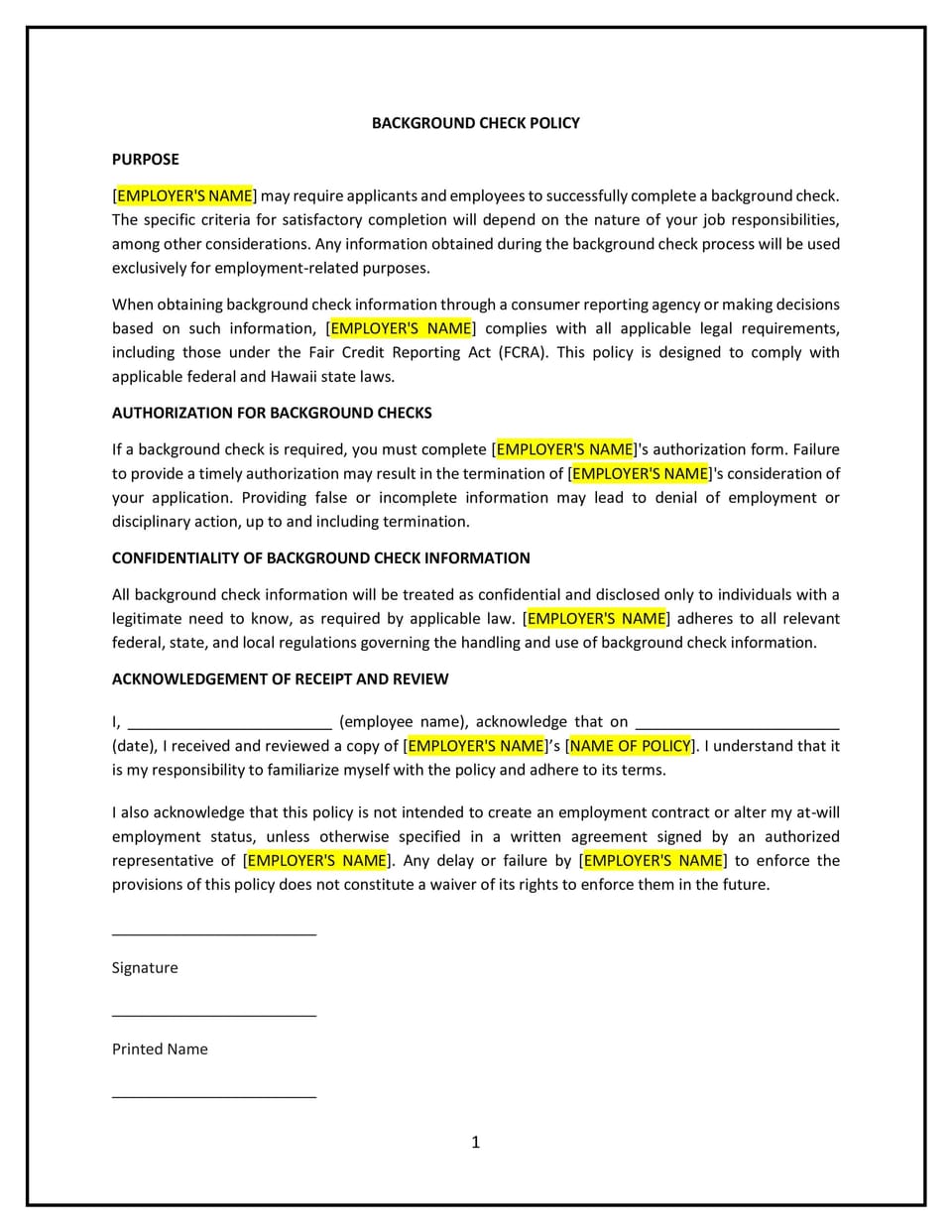Background check policy (Hawai'i): Free template

Background check policy (Hawaiʻi)
A background check policy helps Hawaiʻi businesses establish clear guidelines for conducting pre-employment and ongoing background checks on employees and candidates. This policy outlines the types of checks performed, the procedures for obtaining consent, and the criteria for evaluating results. It is designed to align with Hawaiʻi state laws, such as the Hawaiʻi Fair Employment Practices Act, and federal regulations, including the Fair Credit Reporting Act (FCRA).
By implementing this policy, businesses in Hawaiʻi can make informed hiring decisions, maintain a safe workplace, and demonstrate their commitment to fair and transparent practices.
How to use this background check policy (Hawaiʻi)
- Define the scope of background checks: Specify the types of checks performed, such as criminal history, employment verification, education verification, or credit checks. Ensure the scope aligns with the role’s requirements and Hawaiʻi laws.
- Obtain consent: Businesses should require candidates and employees to provide written consent before conducting background checks. Include a clear explanation of the purpose and process.
- Follow legal requirements: Adhere to Hawaiʻi state laws, such as the ban-the-box law, which restricts employers from asking about criminal history on job applications, and federal regulations like the FCRA.
- Establish evaluation criteria: Define how background check results will be assessed, including what findings may disqualify a candidate or employee. Ensure the criteria are job-related and consistent.
- Provide adverse action notices: If a background check result leads to an adverse decision, businesses should follow FCRA requirements by providing a pre-adverse action notice, a copy of the report, and a final adverse action notice.
- Maintain confidentiality: Safeguard background check information by storing it securely and limiting access to authorized personnel.
- Review and update the policy: Regularly assess the policy’s effectiveness and make adjustments as needed to reflect changes in Hawaiʻi laws, industry standards, or business needs.
Benefits of using this background check policy (Hawaiʻi)
This policy offers several advantages for Hawaiʻi businesses:
- Promotes informed hiring decisions: Background checks help businesses verify candidate qualifications and identify potential risks.
- Maintains a safe workplace: By screening employees, businesses can reduce the risk of workplace incidents and protect other employees and customers.
- Supports compliance: The policy helps businesses align with Hawaiʻi state laws and federal regulations, such as the FCRA and ban-the-box rules.
- Enhances trust: Transparent background check procedures demonstrate a commitment to fairness and accountability.
- Reduces liability: A clear policy minimizes the risk of legal disputes related to hiring practices or background check procedures.
- Encourages consistency: Standardized criteria ensure all candidates and employees are evaluated fairly and objectively.
Tips for using this background check policy (Hawaiʻi)
- Communicate the policy effectively: Share the policy with candidates and employees during the hiring process and through onboarding materials.
- Train HR staff: Businesses should educate HR personnel on the policy’s guidelines, legal requirements, and procedures for conducting background checks.
- Be transparent: Clearly explain the purpose and process of background checks to candidates and employees to build trust and avoid misunderstandings.
- Use reliable providers: Partner with reputable background check providers to ensure accurate and compliant results.
- Respect privacy: Handle background check information confidentially and only use it for legitimate business purposes.
- Review the policy periodically: Update the policy as needed to reflect changes in Hawaiʻi laws, industry standards, or business needs.
Q: Why should Hawaiʻi businesses adopt a background check policy?
A: Businesses should adopt this policy to make informed hiring decisions, maintain a safe workplace, and comply with Hawaiʻi state laws and federal regulations.
Q: What types of background checks can businesses perform?
A: Businesses can perform checks such as criminal history, employment verification, education verification, or credit checks, depending on the role’s requirements and legal limitations.
Q: How should businesses obtain consent for background checks?
A: Businesses should require written consent from candidates and employees, along with a clear explanation of the purpose and process.
Q: What should businesses do if a background check reveals disqualifying information?
A: Businesses should follow FCRA requirements by providing a pre-adverse action notice, a copy of the report, and a final adverse action notice before making a decision.
Q: How can businesses ensure compliance with Hawaiʻi laws?
A: Businesses should adhere to Hawaiʻi-specific laws, such as the ban-the-box law, and federal regulations like the FCRA when conducting background checks.
Q: What should businesses do to protect candidate privacy?
A: Businesses should store background check information securely, limit access to authorized personnel, and use the information only for legitimate business purposes.
Q: How often should the policy be reviewed?
A: The policy should be reviewed annually or as needed to reflect changes in Hawaiʻi laws, industry standards, or business needs.
This article contains general legal information and does not contain legal advice. Cobrief is not a law firm or a substitute for an attorney or law firm. The law is complex and changes often. For legal advice, please ask a lawyer.


